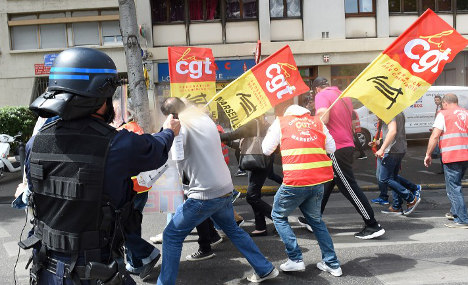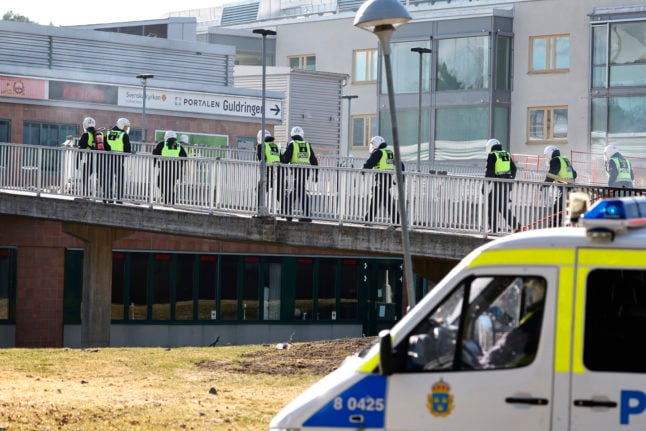Key points:
- Trains hit as rail workers stage second day of walk-out
- Flights cancelled at Paris Orly airport and Toulouse
- Workers at France's nuclear power stations down tools
- Strikes and blockades at oil refineries continue
- Protests against labour reforms scheduled across France
- Bridges and roads blocked around the country
France faced fresh strikes on Thursday after nuclear power station workers voted to join gathering protests against labour law reforms that have forced the country to dip into strategic fuel reserves due to refinery blockades.
With football fans due to flood into France in two weeks for the Euro 2016 championships, pressure is piling on the government as queues at petrol stations lengthen by the day.
Thursday marked the eighth official day of mobilisation against the labour reforms since the protest movement began in March.
Prime Minister Manuel Valls warned the CGT union leading the disruption at refineries and fuel depots that it “does not make the law in France”.
The CGT, locked in an increasingly bitter struggle with the government, has called for its action to be extended Thursday to nuclear power stations that supply 75 percent of the country's electricity.
The union said late Wednesday that 16 of France's 19 nuclear stations had voted to join the strike, although CGT official Jean-Luc Daganaud said the effect on power supply would depend on how many workers downed tools.
However the power stations will not shut down completely and France is not expected to be plunged into darkness just yet.
The union has also called for rallies in major cities, upping the stakes after three months of protests that brought hundreds of thousands on to the streets at their peak at the end of March.
Train services hit
On Thursday the strikes were also set to cause more disruption on the train network as CGT workers staged a walk-out for a second day.
However SNCF say the impact on services will be less than in recent weeks, with almost all TGV (four out of five) trains services running.
Four out of five Transilien commuter trains in Paris will run as normal and most RER lines will only be slightly impacted by the strike, apart from RER B where passengers will encounter the most disruption.
On Wednesday the participation in the strike was down to around 10 percent of workers, down from the 15 percent who took part in the previous week's walk-out.
The Directorate General of Civil Aviation has recommended that carriers cut flights at Paris Orly airport by 15 percent Thursday. According to reports in the south west a similar number of flights have been grounded at Toulouse-Blagnac airport.
Passengers are advised to check with their airlines before travelling to the airport.
Ports blocked
Port workers around France joined in the protests with many ports blockaded like the one in Brest, western France (see below).
Brest. Le port de commerce bloqué depuis 5h30 https://t.co/rb5NFPwT51 pic.twitter.com/imXYpU54px
— Ouest-France (@OuestFrance) 26 mai 2016
Bridges and roads blocked around the country
Apart from the problems around the fuel shortages (see below), driving in France is ill advised on Thursday with protesters also blocking bridges and roads around the country.
On Thursday morning the Tancarville bridge in Normandy was blocked as was the Flaubert bridge in Rouen. Protesters and riot police also massed near the Normandy Bridge although it was not immediately clear whether they would try ot block it.
Au blocage du Pont de Normandie, les manif. se disent motivés par “l'arrogance” de M. Valls. #LeHavre #loielkhomri pic.twitter.com/3VG78SNB4g
— Benjamin Delombre (@bdelombre) 26 mai 2016
Le Parisien newspaper reported that protesters had occupied roundabouts in various parts of the country.
Petrol shortages
France has nearly four months of fuel reserves and President Francois Hollande told a cabinet meeting that “everything will be done to ensure the French people and the economy is supplied”.
With five of France's eight refineries having either halted or slowed production due to ongoing strikes, petrol shortages were still a major issue around France on Thursday.
The latest estimates suggested around one third of the country's 12,000 petrol stations around the country were either out of fuel or running particularly low.
Oil deliveries will become even more difficult Thursday, with work stoppages scheduled in “most ports” after the CGT call.
Motorists in Paris were not spared the crisis and were forced to join queues at petrol stations like much of the rest of the country.
Worried drivers were using online apps to find petrol stations that still had fuel, with many limiting drivers to just 20 litres (five gallons) each.
The Ufip oil industry federation confirmed that with around a third of the country's 12,000 petrol stations running dry, it had begun using strategic reserves.
The unpopular labour reforms are designed to address France's famously rigid labour market by making it easier to hire and fire workers.
But opponents say they are too pro-business and will do little to reduce France's jobless rate of around 10 percent.
An opinion poll on Wednesday said a majority of the public wanted the bill scrapped if it meant the country would not be “blocked” by strikers.



 Please whitelist us to continue reading.
Please whitelist us to continue reading.
Member comments